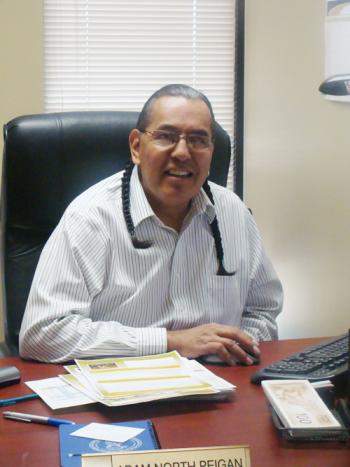Image Caption
Summary
A travelling exhibit that tells the history of the Sixties Scoop and its survivors is on display in Edmonton for one-day only. It’s a sneak peek to be held at the Edmonton Aboriginal Seniors Centre at 10107 134 St. Cottage E.
A special viewing of Bi-Giwen: Coming Home – Truth Telling from the Sixties Scoop will be held Sunday, Jan. 20 from 10 a.m. to 2 p.m. for survivors and those impacted by the scoop. The exhibit will be back in Edmonton in late May. A specific date has yet to be announced.
Bi-Giwen: Coming Home will first travel to other locations around the province. Opening dates are:
February 12th: St. Paul
February 14th: Fishing Lake Metis Settlement
March 4th: Lethbridge
March 6th: Calgary
March 25th: Fort McMurray
April 10th: High Level
April 13th: Gift Lake--Gift Lake Metis Settlement
May 2nd: Peace River
This first of its kind exhibit shares the experiences of Sixties Scoop survivors, and includes 12 personal testimonials of strength and resilience.
The exhibit is part of a $200,000 grant given to the Sixties Scoop Indigenous Society of Alberta (SSISA) to develop public awareness activities, a website at www.ssisa.ca and online resources to support Sixties Scoop survivors.
"The Sixties Scoop Indigenous Society of Alberta is proud to launch this powerful and emotional exhibit that describes the legacy and devastating impacts of the Sixties Scoop in Canada,” said Adam North Peigan, president of the Sixties Scoop Indigenous Society of Alberta. “The exhibit is an opportunity to share and educate Albertans about the history of Canada's Indigenous people in relation to the Sixties Scoop."
In May 2018, Premier Rachel Notley delivered a formal apology for past practices that led to the removal of Indigenous children from their families, resulting in a loss of culture, identity and connection to their communities. The effects of the Sixties Scoop are still felt by survivors and their families today.
“We all have a role to play in our journey towards reconciliation,” said Richard Feehan, minister of Indigenous Relations. “We can’t undo the unimaginable heartbreak experienced by survivors and their families, but we have an opportunity and a responsibility to increase awareness and build a deep understanding, as we move forward together along the path of reconciliation.”
The Sixties Scoop refers to government practices across Canada from the 1950s to the 1980s that led to an unknown number of First Nations, Métis and Inuit children taken from parents, families and communities by child intervention services and placed with mostly non-Indigenous families. Many of these children experienced abuse, mistreatment and neglect and lost touch with their families, communities, culture and traditional language.
“The apology for the Sixties Scoop was an important step forward in reconciliation and an important step forward toward healing for survivors,” said Danielle Larivee, minister of Children’s Services in Alberta.
“The Sixties Scoop was a dark part of Alberta’s history that all Albertans need to be aware of, and this exhibit shares the stories of survivors in their words to help us all better understand what they went through. Through understanding our shared history, we can move forward together to a better future.”
The Sixties Scoop Indigenous Society of Alberta is a non-profit society formed to represent survivors in Alberta, create dialogue and engagement and develop true reconciliation. Board members include representatives from Treaty 6, Treaty 7, Treaty 8, as well as Inuit and Métis representatives.
Between January and March 2018, the Government of Alberta worked with SSISA to conduct engagement sessions across Alberta. The sessions provided an opportunity to listen to survivors and empower them in a respectful and inclusive engagement, which informed the Premier’s apology.

